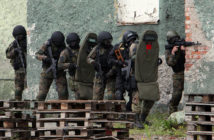The recent dismantlement of an al-Qaeda cell in Tunisia prompted Algerian and Tunisian authorities to take action.
By Monia Ghanmi for Magharebia in Tunis
![[AFP/Abderrazek Khlifi] Tunisian authorities will co-operate with their Algerian counterparts to secure their common border.](http://magharebia.com/cocoon/awi/images/2012/12/27/121227Feature1Photo1.jpg)
[AFP/Abderrazek Khlifi] Tunisian authorities will co-operate with their Algerian counterparts to secure their common border.
Tunisia and Algeria want to strengthen security co-operation along their common land border to counter potential attacks from al-Qaeda in the Islamic Maghreb (AQIM).
The deal was struck during Algerian Interior Minister Dahou Ould Kablia’s visit to Tunis on December 24th, where he met with Interim Prime Minister Hamadi Jebali and Interior Minister Ali Larayedh.
The agreement came after Tunisian authorities thwarted an attempt by AQIM to establish a terror cell in the western regions of Kasserine and Jendouba. The group was planning to carry out sabotage activities targeting institutions in both Tunisia and Algeria.
“The talk turned on the co-ordination of security action, notably in matters of fight against terrorism, trafficking and illegal immigration, in addition to the exchange of expertise,” Ould Kablia said during his two-day visit.
They also discussed ways to ease the customs department work in transit areas, to enforce border protection, in addition to the creation of joint patrols.
Additionally, the meeting dealt with co-ordinating bilateral security activities between the two countries in order to address issues of terrorism, smuggling and illegal immigration, as well as to share best practices in the field of security.
The ministers agreed to secure the common land border and to address border infiltrations of criminal groups active in terrorism and affiliated with al-Qaeda, the statement published by the Tunisian interior ministry read.
The governors of the border areas between the two countries also met to create an “action plan for the development of these areas and to facilitate consular services such as the free movement of persons, and the right to property and residency”, Ould Kablia noted.
As to the situation in Mali where active militant groups control the northern part of the country, Larayedh said that Tunisia and Algeria “have agreed completely and have already clarified their joint stance rejecting any military intervention”, adding that a military solution “only complicates matters”.
The length of the common land border between Tunisia and Algeria is about 1,000 kilometres, and serves as a vital link for the smuggling of goods, fuel, drugs and weapons.
Tunisians praised this agreement, all the while deeming it insufficient. Confronting AQIM should be a regional effort to be conducted by the five Maghreb countries, some commented.”Insecurity and political instability in both Libya and Tunisia, as well as the security vacuum in the desert, are all factors that have led to the expansion of the influence of al-Qaeda in the Maghreb,” said Rachid Beltifa, a cashier.
He pointed out that the recent arrests of terrorists serve as evidence that this organisation has begun imposing its presence in the region.
“Governments should stand firm and leave conflicts and disputes aside that have hindered attempts at co-operation in past years,” he added. “This situation of conflict mostly benefits al-Qaeda. It is time for the return of dynamism to relations and of warmth to security co-operation and security co-ordination for the sake of the people, in support of stability in the region.”
Abd Hafidh Maissour, a merchant, is hopeful: “There is a conviction among state officials about the efficacy of teamwork. I hope that this co-operation extends to other fields.”






